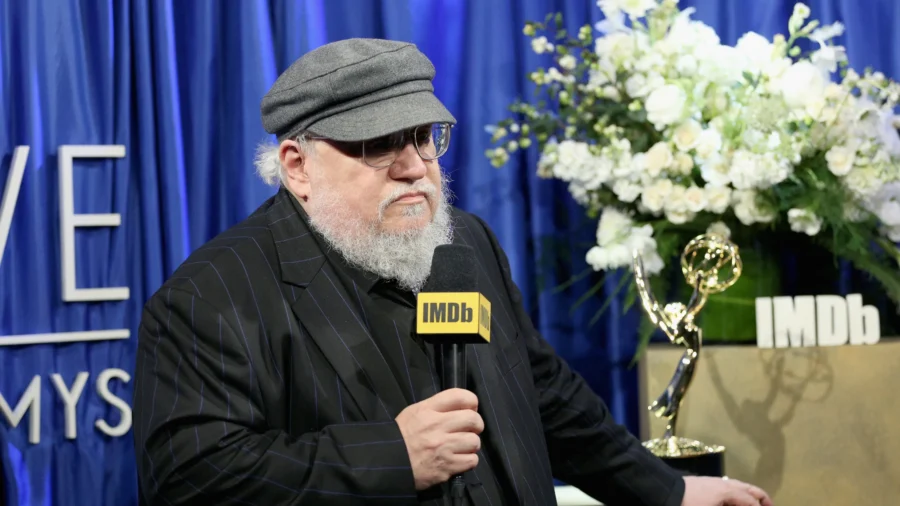“Game of Thrones” and “Elden Ring” writer George R. R. Martin is joining a coalition of over a dozen authors to sue OpenAI in a bid to stop the ChatGPT developer from using their copyrighted books to train artificial intelligence (AI) models.
Originally a non-profit AI research organization, OpenAI is now a Microsoft-backed, $30 million for-profit company. In the battle to dominate the AI market, OpenAI established itself as a frontrunner last November by launching AI-powered chatbot ChatGPT, which gained 100 million users faster than any software product that came before it.
For years, OpenAI trained its AI logarithms by feeding them extremely large amounts of textual data, from which the systems independently discover patterns and structures before they can produce seemingly human-written texts on their own. It is now facing a class action copyright lawsuit from 17 prominent writers whose copyrighted works have allegedly been fed to those logarithms without their consent.
The lawsuit, filed Tuesday in a federal court in New York by advocacy group Authors Guild on behalf of the writers, accused OpenAI of copying their works “wholesale, without permission or consideration” for its own profit.
“These algorithms are at the heart of [OpenAI’s] massive commercial enterprise. And at the heart of these algorithms is systematic theft on a mass scale,” the Guild said in the 47-page complaint (pdf).
The basis of the complaint comes from the fact that, until very recently, ChatGPT could be prompted to provide verbatim quotes from Mr. Martin’s “A Song of Ice and Fire” saga and fictional works alike. This functionality was removed following recent updates, but ChatGPT can still be asked to summarize or paraphrase those books.
“These summaries are themselves derivative works, the creation of which is inherently based on the original unlawfully copied work,” the Guild argued.
It’s almost certain that ChatGPT has ingested unauthorized copies of those novels. In fact, ChatGPT itself admitted as such.
“It is possible that some of the books used to train me were under copyright. However, my training data was sourced from various publicly available sources on the internet, and it is likely that some of the books included in my training dataset were not authorized to be used,” the chatbot said, according to the lawsuit.
“If any copyrighted material was included in my training data, it would have been used without the knowledge or consent of the copyright holder.”
The authors also took issue with ChatGPT helping users to impersonate specific writers and craft “low-quality” e-books. They said some of those ChatGPT-written e-books are being sold online under their names, damaging their reputations and livelihoods.
In the case of Mr. Martin, the Guild alleged that ChatGPT was used to generate imitations of the long-awaited sequel to his widely popular novel series.
“When prompted, ChatGPT generated an infringing, unauthorized, and detailed outline for an alternate sequel to ‘A Clash of Kings,’ … and titled the infringing and unauthorized derivative ‘A Dance With Shadows,’ using the same characters from Martin’s existing books in the series A Song of Ice and Fire,” the Guild wrote.
“ChatGPT is being used to generate low-quality ebooks, impersonating authors, and displacing human-authored books,” it argued. “Professional writers are thus reasonably concerned about the risks OpenAI’s conduct poses to their livelihoods specifically and the literary arts generally.”
Specifically, the Guild is asking the court to prohibit OpenAI from further use of copyrighted works for AI training, in addition to a restitution of up to $150,000 for each infringed work.
In a statement following Tuesday’s lawsuit, OpenAI said it “respects” the rights of writers and authors, and believes that they too should “benefit from AI technology.”
“We’re having productive conversations with many creators around the world, including the Authors Guild, and have been working cooperatively to understand and discuss their concerns about AI,” a spokesperson for the company said.
“We’re optimistic we will continue to find mutually beneficial ways to work together to help people utilize new technology in a rich content ecosystem.”
The lawsuit also comes amid the prolonged strike by Hollywood writers over earnings and the impact of AI technology on the screenwriting industry. In May, during the negotiations between the Writer’s Guild of America (WGA) and the Alliance of Motion Picture and Television Producers (AMPTP), the screenwriters’ union said they could only tolerate the use of generative AI so far as it remains just a writing assistant tool.
Specifically, the screenwriters demanded that studios stop regarding AI-written screenplay or dialogue as “literary material,” or an original piece of work. This would mean that AI won’t be getting credit for writing any material that ends up being used in shows or films, and that screenwriters have a better shot at getting paid a full writing fee. They also didn’t want their work to be used to train AI.
“It is important to note that AI software does not create anything. It generates a regurgitation of what it’s fed,” the WGA West, a sub-union headquartered in Los Angeles, wrote on X.
“If it’s been fed both copyright-protected and public domain content, it cannot distinguish between the two. Its output is not eligible for copyright protection, nor can an AI software program sign a certificate of authorship.”
The AMPTP rejected those demands and instead offered “annual meetings [with the union] to discuss advancements in technology.” The two sides are expected to sit face-to-face and talk for a second time on Thursday.
From The Epoch Times

